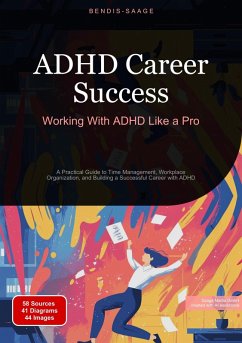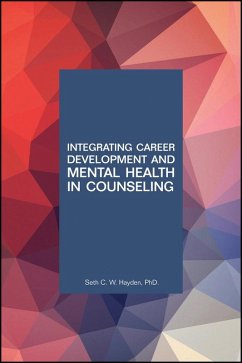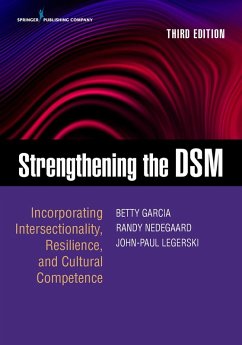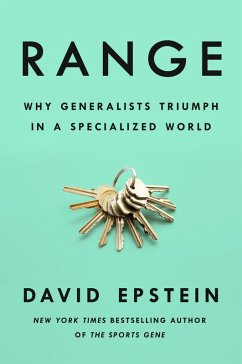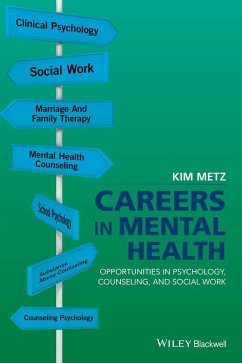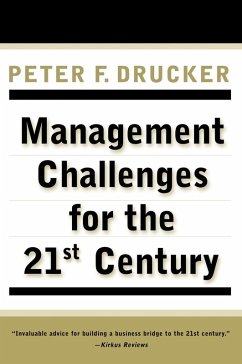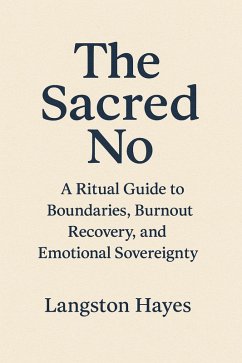
Strengthening Mental Health Through Effective Career Development (eBook, ePUB)
A Practitioner's Guide

PAYBACK Punkte
6 °P sammeln!
This book makes the case that career development practice is a mental health intervention, and provides skills and strategies to support career development practitioners in their work. It explores how practitioners do far more than help people prepare for, enter and navigate career pathways - they change people's lives in ways that improve mental health and overall well-being.The guide shows ways to connect career development services to clients' mental health concerns while working ethically and within the boundaries of competence and role. Practitioners will be equipped to improve their care...
This book makes the case that career development practice is a mental health intervention, and provides skills and strategies to support career development practitioners in their work. It explores how practitioners do far more than help people prepare for, enter and navigate career pathways - they change people's lives in ways that improve mental health and overall well-being.
The guide shows ways to connect career development services to clients' mental health concerns while working ethically and within the boundaries of competence and role. Practitioners will be equipped to improve their career development services, broaden their view of client concerns to include well-being outcomes as part of a whole-person approach to career/life planning, and strengthen their collaboration with healthcare service providers. The authors also emphasize their focus is mental health, not mental illness, and address this distinction in the book.
Written by Dave Redekopp and Michael Huston of Canada's Life-Role Development Group Ltd., with the support of CERIC, Simon Fraser University and the Australian Centre for Career Education, this resource will assist career practitioners around the world to:
• Consider the mental health impact of their services • Be intentional about the mental health impact of their services • Improve the mental health impact of their services • Evaluate the mental health impact of their services, and • Communicate the mental health impact of their services to relevant stakeholders, including policy-makers
The book has been written primarily for career development practitioners, namely those who help clients or students, 1-to-1 or in groups. This includes academic advisors, career coaches, guidance counsellors, employment specialists and human resources practitioners. Additionally, the book is intended to be of use to the supervisors and managers of career development practitioners, particularly those responsible for service evaluation, fund development and community engagement. Researchers and academics will also find a robust and testable model of career development and mental health relationships.
The guide shows ways to connect career development services to clients' mental health concerns while working ethically and within the boundaries of competence and role. Practitioners will be equipped to improve their career development services, broaden their view of client concerns to include well-being outcomes as part of a whole-person approach to career/life planning, and strengthen their collaboration with healthcare service providers. The authors also emphasize their focus is mental health, not mental illness, and address this distinction in the book.
Written by Dave Redekopp and Michael Huston of Canada's Life-Role Development Group Ltd., with the support of CERIC, Simon Fraser University and the Australian Centre for Career Education, this resource will assist career practitioners around the world to:
• Consider the mental health impact of their services • Be intentional about the mental health impact of their services • Improve the mental health impact of their services • Evaluate the mental health impact of their services, and • Communicate the mental health impact of their services to relevant stakeholders, including policy-makers
The book has been written primarily for career development practitioners, namely those who help clients or students, 1-to-1 or in groups. This includes academic advisors, career coaches, guidance counsellors, employment specialists and human resources practitioners. Additionally, the book is intended to be of use to the supervisors and managers of career development practitioners, particularly those responsible for service evaluation, fund development and community engagement. Researchers and academics will also find a robust and testable model of career development and mental health relationships.
Dieser Download kann aus rechtlichen Gründen nur mit Rechnungsadresse in A, D ausgeliefert werden.




